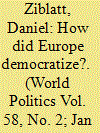|
|
|
Sort Order |
|
|
|
Items / Page
|
|
|
|
|
|
|
| Srl | Item |
| 1 |
ID:
074557


|
|
|
|
|
| Publication |
2006.
|
| Summary/Abstract |
This article examines mediation in conflicts using both a game-theoretic model and a quantitative analysis. The game-theoretic model suggests that mediator effectiveness rests primarily on the ability of third parties to provide critical information about the disputants' reservation points. The empirical analysis finds that mediation that targets asymmetric information is a highly effective form of conflict management. Moreover, the results suggest that mediation outperforms other forms of third-party intervention, including those that entail coercion. Both the model and quantitative analysis indicate that impartial mediators will generally outperform biased ones. Along with providing new information on conflict management, the quantitative analysis also has broader implications for IR theory. The results provide empirical support for the rationalist claim that asymmetric information is one of the root causes of war.
|
|
|
|
|
|
|
|
|
|
|
|
|
|
|
|
| 2 |
ID:
074560


|
|
|
|
|
| Publication |
2006.
|
| Summary/Abstract |
How was democracy achieved in nineteenth-century Europe? This article reviews fours recent books that bring democracy's first wave "back in" to mainstream political science. By launching an important two-way interchange between earlier and subsequent waves of democratization, the books address three core questions: what prompts democratic openings; who are the most important actors in the push for democratization; and once undertaken, how is democracy secured. The four works offer different and at times competing answers to these questions, but all suggest that democracy's first wave was neither exceptional nor inevitable. Instead, it was marked by its own share of concessions and uncertainties, indicating the enduring relevance of Europe's democratization for contemporary cases.
|
|
|
|
|
|
|
|
|
|
|
|
|
|
|
|
| 3 |
ID:
074558


|
|
|
|
|
| Publication |
2006.
|
| Summary/Abstract |
Why would democracies extend to aliens a right they historically have reserved for citizens-the right to vote? Some scholars argue that transnational movements and global norms increasingly moderate how states treat their aliens. If so, this is important evidence of a change in the meaning and content of sovereignty. This article investigates whether democratic states enfranchise their aliens in response to international, transnational, or domestic factors. While the article finds little support for transnational or systemic arguments, it also finds that political parties and judiciaries affect opportunities for aliens in ways the existing scholarship fails to explain. These findings suggest that both comparative and IR scholarship need to revisit their explanations for contemporary citizenship politics in democracies.
|
|
|
|
|
|
|
|
|
|
|
|
|
|
|
|
| 4 |
ID:
074556


|
|
|
|
|
| Publication |
2006.
|
| Summary/Abstract |
The power resources approach, underlining the relevance of socioeconomic class and partisan politics in distributive conflict within capitalist economies, is challenged by employer-centered approaches claiming employers and cross-class alliances to have been crucial in advancing the development of welfare states and varieties of capitalism. Theoretically and empirically these claims are problematic. In welfare state expansion, employers have often been antagonists, under specific conditions consenters, but very rarely protagonists. Well-developed welfare states and coordinated market economies have emerged in countries with strong left parties in long-term cabinet participation or in countries with state corporatist institutional traditions and confessional parties in intensive competition with left parties.
|
|
|
|
|
|
|
|
|
|
|
|
|
|
|
|
| 5 |
ID:
074559


|
|
|
|
|
| Publication |
2006.
|
| Summary/Abstract |
Do ethnic federations undergoing democratization promote or discourage regional secessionism? This article argues, based on evidence from the Russian Federation, that when democratization produces a transfer of political accountability from center to region, the incentives of regional leaders shift, forcing them to react to local constituencies in order to retain office. If these constituencies desire autonomy, regional leaders must respond, making separatism not merely an opportunistic strategy but a necessary one for their own political survival. Democratization, then, can transform administrative regions into electoral arenas.
However, the case of Russia also demonstrates that regional demands for autonomy are not inevitable and may dissipate after they have begun. Popular support for nationalism and separatism varied significantly among Russia's sixteen ethnic republics in the late Soviet and early post-Soviet period. This variation is explained by showing that mass nationalism, contrary to conventional wisdom, is neither a latent attribute of federal regions, nor a simple function of natural resource endowments, nor something summoned into existence by the manipulations of regional leaders. Rather, it is argued that increasing competition for jobs in the Soviet Union's failing economy allowed particular issues articulated by nationalist leaders to resonate with ethnic populations. Through the framing of issues of ethnic economic inequality, nationalist leaders were able to politicize ethnicity by persuading people to view their personal life chances as dependent on the political fate of their ethnic community. Thus, secession in democratizing ethnic federations can be best understood by directing attention toward the origins of popular support for nationalism and the role that support plays in the elite contest for power within subfederal regions.
|
|
|
|
|
|
|
|
|
|
|
|
|
|
|
|
|
|
|
|
|